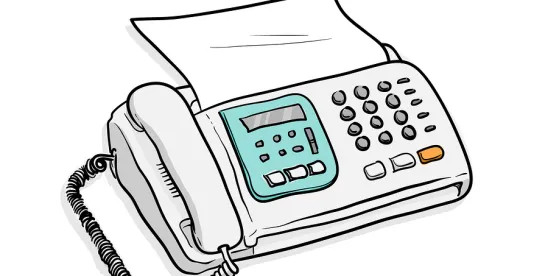Hey TCPAWorld!
Litigation is a pursuit of the truth, and the truth has a way of resurfacing—often from the same hands that tried to bury it.
In Loop Spine & Sports Ctr., Ltd. v. Am. Coll. of Med. Quality, No. 22 CV 4198, 2025 WL 1446504 (N.D. Ill. May 20, 2025), Loop Spine & Sports Center, Ltd. (“Plaintiff”), an Illinois chiropractic and sports injury company, sued American College of Medical Quality, Inc. (“ACMQ”), Affinity Strategies, and a former ACMQ executive, Daniel McLaughlin (collectively, the “Defendants”) for sending an unsolicited fax promoting a medical conference, alleging violations under the TCPA.
Plaintiff sought certification and the motion was granted.
Background
Here’s the rundown. ACMQ engaged McLaughlin, who then enlisted Jim Dodge (McLaughlin’s acquaintance) and Michael Henry (who is in the business of distributing faxes), to promote its 2022 “Care After Covid” conference via a “blast fax” campaign to doctors in the Chicago area. Id., at *2. Together, the group compiled 13,850 contacts to reach. Plaintiff was a recipient of one of the faxes and subsequently sued.
The parties disagree on two substantive factual issues related to class certification: (1) how many faxes were actually sent, with Plaintiff contending at least 6,500, while Defendants assert 28, and (2) whether Plaintiff or other putative class members provided permission for the fax. Defendants assert that Henry called Plaintiff, spoke to an employee, and obtained oral consent before sending the fax, however the employee testified to having no recollection of such a call.
Defendants attempted to reconcile Henry’s previously conflicting statements by claiming his reference to “a little over 6500 faxes delivered” meant the numbers were sent to a data cleaning service, but most of those faxes were not actually transmitted, and that Plaintiff’s “fax was part of [a] modest test run.” Id., at *3 (citations omitted). However, Defendants highlight that there is no evidence of any pre-suit mention of such a service, and Henry himself testified he has no records of any communication or transaction with a data cleaning provider. Plaintiff also emphasizes the inconsistencies in Henry’s testimony, stating he sent test faxes to 22 people, but originally mentioned 28 in his affidavit, and claimed in an email that he sent only a single fax.
Another wrinkle in the dispute is that, after being instructed to halt the blast fax campaign, Henry allegedly deleted all the relevant records—prompting Plaintiff to seek an adverse inference. Defendants counter that Henry is not a party to the case and that Plaintiff failed to timely raise the issue in its class certification motion, rendering any adverse inference unwarranted.
Analysis
To pursue class certification, Plaintiff must satisfy the Rule 23(a) prerequisites—numerosity, commonality, typicality, and adequacy—then show they qualify for a particular type of class action under Rule 23(b). Here, Plaintiff argues that it meets the Rule 23(b)(3) requirements that common questions of law and fact predominate and that class action resolution is superior to other methods.
Numerosity
To satisfy numerosity under Rule 23(a)(1), Plaintiff must show that the class is so numerous that joinder of all members is impractical, with the Seventh Circuit recognizing that around forty members typically suffices. Here, Plaintiff argues that even 1% of the 6,500 faxes which were allegedly delivered would establish numerosity. In particular, Plaintiff used the following correspondences between Henry and McLaughlin for support:
On August 6th, “I have scheduled this to run starting at 12 noon Sunday – if your happy with what the customer will receive it will go out”
On August 7th, “we are sending 14352 faxes today”
On August 8th, “we got a little over 6500 faxes delivered” and that the “second attempt” will pick up another 750
Id., at *4. Defendants counter by citing Henry’s post-suit deposition and affidavit claiming he only sent 28 faxes to parties who had consented, but the Court finds that this later testimony lacks credibility due to inconsistencies in Henry’s previous remarks, absence of corroborating evidence, and Henry’s deletion of relevant records. Ultimately, the Court concluded that Plaintiff has established numerosity.
Commonality
To satisfy commonality under Rule 23(a)(2), Plaintiff must show that there are common questions of law or fact capable of class-wide resolution, meaning the answers would resolve issues central to all class members. The Seventh Circuit holds that in cases under the TCPA, such as whether a fax is an advertisement, this standard is typically met because these are common questions across recipients, and “[n]othing about the instant case persuades the Court to depart from this general principle.” Id., at *5. The Court found commonality satisfied because the identical fax was allegedly sent to all recipients by the same marketing project, raising a shared legal question about whether the fax was an ad and who is liable for sending it. Defendants argue that the “distinction between traditional and online efaxes defeat commonality”, but the Court rejects this, noting that “commonality requires one common question, not the absence of any individual questions.” Id.
Typicality
Typicality under Rule 23(a)(3) requires that the representative plaintiff’s claims arise from the same course of conduct and share the same essential characteristics as the class members’ claims. Plaintiff, like all putative class members, allegedly received the same fax promoting the ACMQ conference, and the Defendants do not contest typicality. Thus, the Court concluded that typicality was satisfied.
Adequacy
Adequacy under Rule 23(a)(4) requires that the named plaintiff and their counsel fairly and adequately protect the interests of the class. Defendants challenged Plaintiff’s adequacy by pointing to Henry’s testimony that he received permission from Plaintiff to send the fax, suggesting Plaintiff was not harmed and thus unsuitable to represent the class. However, the Court found Henry’s testimony unconvincing, especially in light of the employee’s testimony that Plaintiff had a strict policy against receiving unsolicited faxes. The Court concluded that Henry’s statements did not undermine Plaintiff’s adequacy as a representative. Additionally, the Court found no issues with class counsel’s adequacy, noting their experience and lack of conflict. Accordingly, the Court determined that both Plaintiff and its counsel satisfied the adequacy requirement.
Rule 23(b)(3)
Rule 23(b)(3) requires that common questions of law or fact predominate over individual ones, and that a class action is superior to other methods for fairly and efficiently resolving the controversy. Predominance exists when core issues can be resolved on a class-wide basis, such as whether a fax was an advertisement, whether it violated the TCPA, and who is liable for the violation. Superiority is satisfied when a class action would promote efficiency and consistency in adjudication, especially for claims involving small individual stakes.
Defendants argued that predominance fails because individual issues—particularly whether each recipient consented to the fax—would require separate analysis. The Court rejected this, finding that Henry’s claim of consent only related to Plaintiff and not to other recipients, making consent a class-wide issue rather than an individualized one. Moreover, even if consent is an affirmative defense, it is the Defendants’ burden to prove and must be shown for each class member. The Court concluded that evidence of prior express permission did not predominate over the shared legal and factual questions. It also found superiority satisfied, noting that class-wide resolution would conserve resources and promote uniformity. Thus, Plaintiff met both the predominance and superiority requirements of Rule 23(b)(3).
Ascertainability
Ascertainability demands that a class is defined clearly and based on objective criteria. Defendants argued Plaintiff’s original class definition was improper because it hinged on whether faxes were sent “by or on behalf of” certain Defendants, making it a merits-based, fail-safe class. Id., at *7. In reply, Plaintiff proposed a revised definition:
“All persons with fax numbers, who on August 6–10, 2022, were sent faxes in the form of Exhibit A.”
Id. The Court found this new definition objective and free of merits issues, concluding ascertainability was satisfied.
Conclusion
Plaintiff’s Motion was granted, and the class is certified. The Court appointed Plaintiff as class representative and Edelman, Combs, Latturner & Goodwin, LLC as class counsel.
Keep in mind – the truth will find its way. Often delayed but rarely denied.
Until the next one, TCPAWorld!




 />i
/>i
